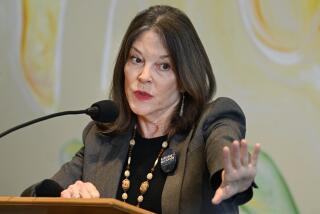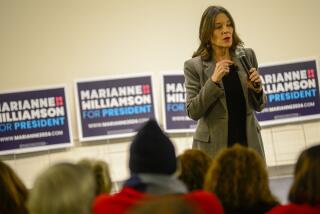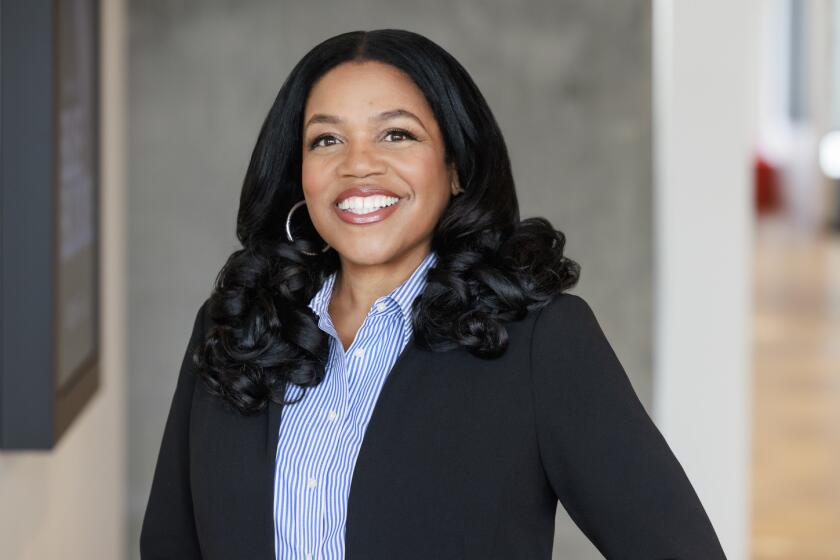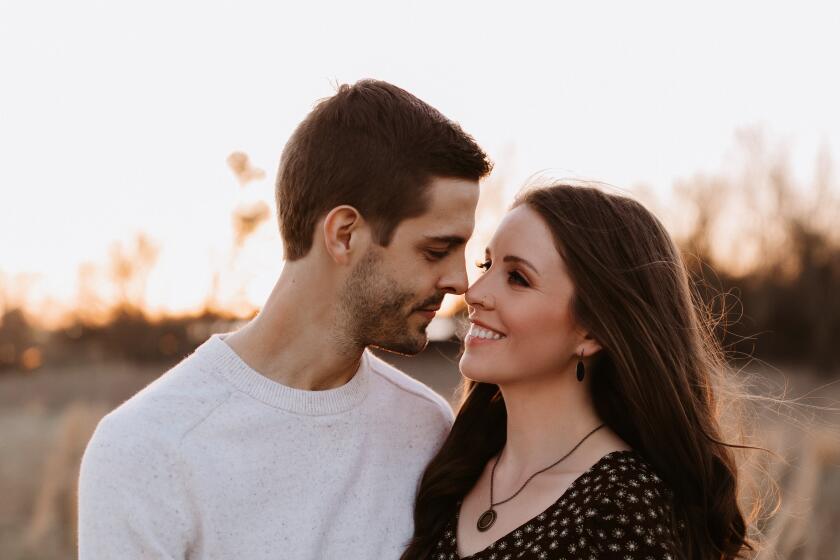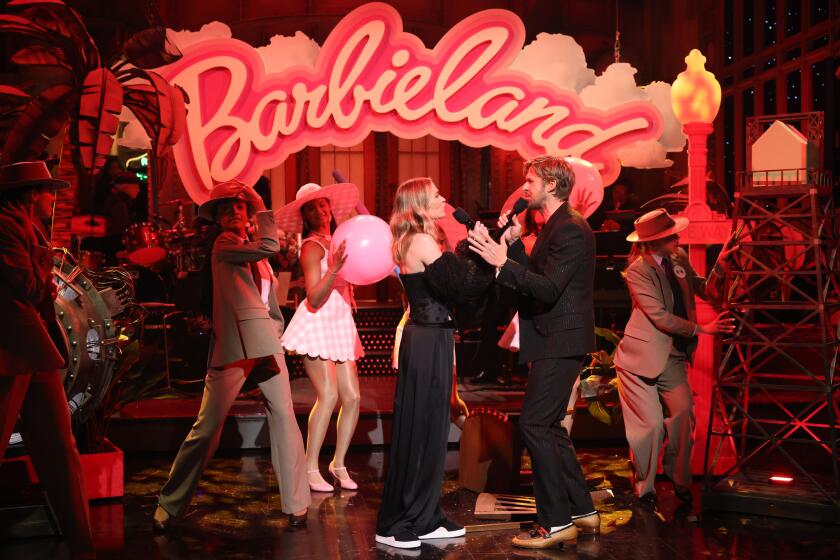Review: In Oprah Winfrey special, Michelle Obama proves she’s a political force (even if she’s not running for office)
Sorry, folks: She’s not running.
In a frequently compelling hour-long conversation Monday night on CBS with Michelle Obama, Oprah Winfrey asked about the difficulties of life in the White House and her role as the nation’s first black first lady. Obama was, as ever, the personification of a class act, acknowledging the bitterness of this year’s election while going out of her way to avoid stoking the partisan flames any further.
But what Winfrey really wanted to know about — like, really, really — was whether Obama had political aspirations of her own, bringing up the possibility no fewer than three times. Would she run for office? Like, maybe not for president, but for any kind of office? So that’s a firm no, then? OK. But had she had any conversations with the Democratic Party about running for office? Surely, party representatives had asked her, right? Any thoughts about a running mate for 2020?
I kid, but only slightly. Despite Winfrey’s keen and entirely understandable interest in Obama’s future career plans, probably the biggest takeaway from “First Lady Michelle Obama Says Farewell to the White House — an Oprah Winfrey Special,” is that the first lady is entirely too sensible to become a politician herself.
“I’m not coy… If I were interested in it, I’d say it. I don’t believe in playing games,” said Obama, whose forthrightness about not wanting to run is, ironically, only likely to make people even more desperate for her to do just that. “People don’t really understand how hard this is.”
Despite her understandably weary air, Obama demonstrated once again why she’s become one of the Democratic Party’s most formidable ambassadors, as well as a figure whose popularity transcends partisan politics.
Speaking of her husband and two daughters, Obama displayed warmth, relatability and a strong protective streak; she is very much the mom-in-chief. As witnessed in her widely circulated speeches at the Democratic National Convention and in New Hampshire, she has perfected the high-wire act of expressing outrage without losing her cool, of being diplomatic but not evasive, of steadfast dignity in an atmosphere of ever-increasing coarseness.
Regarding her successor, Obama struck a gracious tone and emphasized the importance of a smooth transition. She pointed to the example set by Laura Bush, and recalled telling Melania Trump that “my door is open.”
“We are going to be there for the next president and do whatever we have to do to make sure that he is successful,” she said, “because if he succeeds, we all succeed.”
At the same time, she didn’t backpedal or pretend as if the grievances of the campaign — and particularly Donald Trump’s treatment of women — had somehow been forgiven.
“To have a candidate for the presidency speaking in such terms about women, as I said, it was not a normal thing,” Obama said, continuing her shrewd habit of not uttering the name Trump. “A lot of people had been shaken to their core, and still are. They are still feeling the reverberations of that kind of caustic language.”
Obama also defended her husband’s message of hope, saying that “now we’re feeling what not having hope feels like.”
The exchange has been interpreted as a critique of Trump and an expression of the despair felt by many Hillary Clinton supporters. But it also speaks more broadly to the tense geopolitical climate , heightened by fresh terrors Monday in Berlin and Ankara, Turkey.
Obama’s poise makes the attempts to caricature her as an “angry black woman” all the more ridiculous. In one of the more illuminating exchanges of the hour, Winfrey asked directly about this pernicious stereotype, frequently wielded against the first lady in the early days of her husband’s administration.
“That was one of those sort of things where you think, ‘Dag, you don’t even know me,’ ” said Obama, never afraid of slipping in a bit of slang or a knowing pop culture reference (see her use of the phrase “bye, Felicia”).
With Obama and Winfrey seated around a crackling fire in a room festooned with Christmas garland, the special had the cozy warmth of a conversation between two girlfriends sipping eggnog (an impression heightened by a brief visit from President Obama, who remained standing like an interloper at a bridal shower).
Of course, Winfrey and Michelle Obama have much in common, from their Chicago ties to their shared love of fresh produce to their status as two of the country’s most influential women. Their relationship dates to 2007, when Winfrey became one of Barack Obama’s earliest and most enthusiastic celebrity endorsers.
The dynamic has shifted since then, with Michelle Obama now equaling (and possibly surpassing) Winfrey in terms of public adoration, and her mantra — “When they go low, we go high” — becoming a national rallying cry.
The interview came to life most vividly at moments when Winfrey and Obama spoke frankly about their roles as highly visible black women in a country still grappling with racism and sexism. (If only Beyoncé had been there to complete the triumvirate.)
Asked about her greatest impact as first lady, Obama noted the importance of being an “educated, strong, outspoken” role model to young women, “particularly African American women.”
Obama also prompted a hearty “mmm-hmmmm” from Winfrey when she spoke of the need to move past the darker chapters of her life in the White House, because “we as black women better be able to do it.”
“There’s so much that comes at us all the time, every day, in subtle ways that could tear your soul apart if you let it,” she continued. “But my mother always taught me, ‘Girl, you better keep it moving.’ You know? You better brush it off.”
Inevitably, given the limited running time and her eagerness to discuss “glamping,” there were many relevant questions Winfrey never got around to asking. Perhaps to maintain some semblance of national unity, she avoided more pointed queries about Trump and his wife — like, say, how it feels for Obama to hand over the White House to the world’s most prominent birther, or what the first lady made of the plagiarism kerfuffle regarding a speech given by Melania Trump at the Republican National Convention.
And there was one question that Winfrey kept circling without ever asking: How did it feel for Obama, a highly accomplished professional woman, to step into the traditional role as the country’s most prominent housewife? As Obama herself noted at one point, “I just didn’t wake up first lady.”
Or what of the irony that she has grown so popular largely by staying out of the political fray?
As Clinton knows all too well, the American public tends to like first ladies more the less they have to say. Even Obama’s mission to encourage healthful eating habits in children — a stance about as controversial as brushing your teeth twice a day — drew ridiculous “nanny state” allegations from some detractors. Weren’t there times when she wanted to scream from the rooftops?
Perhaps Obama will address all this and more in her almost-certainly-forthcoming memoir. In any case, I’m ready to pre-order a copy.
See the most-read stories in Entertainment this hour »
Follow me @MeredithBlake
More to Read
The complete guide to home viewing
Get Screen Gab for everything about the TV shows and streaming movies everyone’s talking about.
You may occasionally receive promotional content from the Los Angeles Times.
